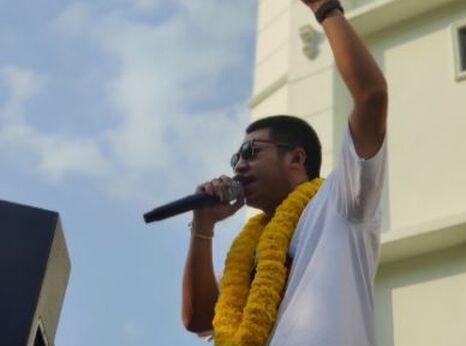Peaceful protestors face years in prison

Authorities in Thailand are instituting a new wave of repression against a peaceful youth reform movement that has held mass, overwhelmingly peaceful protests and flash mobs during 2020 for political, constitutional and educational reform, LGBTQI equality and women’s and children’s rights. After protesters publicly discussed calls for reform to the monarchy, authorities detained and charged dozens of peaceful protesters. The ongoing crackdown corresponds to an established pattern of official legal harassment of individuals exercising their rights. Thai authorities have characteristically filed multiple criminal proceedings against government critics and political protest movements, tying them up with long-running criminal proceedings with a chilling effect on the exercise of rights to peaceful assembly and expression.
High school student Benjamaporn ‘Ploy’ Nivas (f), aged 16, a youth activist in the campaign group “Bad Students”; university sociology student and Student Union of Thailand leader Panusaya ‘Rung’ Sittijirawattanakul (f) aged 22, Tattep ‘Ford’ Ruangprapaikitseree, a 23 year old LGBTQI and pro-democracy activist, and Jatupat ‘Pai’ Boonpattararaksa, aged 29, a legal expert and former prisoner of conscience are at risk of between two years and decades of imprisonment for speaking at demonstrations, peacefully protesting or sharing information about protests on social media. They are among hundreds of school and university students and activists who authorities have detained during 2020, filed criminal proceedings against or intimidated.
In late November 2020, police summoned or sought warrants to arrest protest leaders across Thailand for sedition, computer crimes, offences to the monarchy, and public assembly. Benjamaporn ‘Ploy’ Nivas and two fellow leaders of the ‘Bad Students’ campaign group were summoned for infringing a ban on public gatherings imposed under the 2005 Emergency Decree for speaking at a public rally on 15 October 2020.
At least 32 protesters, including ‘Rung’, ‘Ford’, ‘Pai’, and other protest leaders, as well as two children under 18 years old, face proceedings for alleged lèse majesté under Article 112 of Thailand’s Penal Code for speeches or actions taken in recent demonstrations. Authorities indicate they are also further investigating, and censoring, individuals posting materials on social media that are related to the protests. In recent years, officials have repeatedly used this law to criminalise peaceful dissent and target political opponents. In December 2017, authorities detained and then imprisoned ‘Pai’, then a law student, for nearly two and a half years for forwarding a BBC profile of King Rama X on Facebook.
On 18 July 2020, 31 individuals, including several university students, had participated in a peaceful demonstration at the Democracy Monument in Bangkok, Thailand’s capital, organized by a student-led movement called Free Youth. The gathering attended by an estimated 2,400 protestors listed three demands to the Thai government: parliament dissolution and fresh elections, a new constitution, and an end to harassment against individuals.
Of these, in addition to ‘Pai, ‘Ford’ and ‘Rung’, authorities have also targeted at least eight others after this demonstration with summons or charges for sedition and lèse majesté related to specific demonstrations, among the 31 activists previously charged for their peaceful exercise of freedom of assembly (See previous UA).